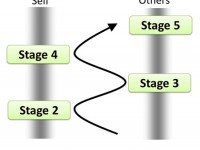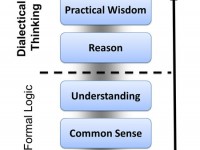Buchbesprechung Otto Laske, Dialectical Thinking For Integral Leaders: A Primer Integral Publishers, ISBN 978-0-9904419-9-1, 2015 (June) Zusammenfassung In dieser Buchbesprechung hebt Michael Habecker die wesentlichen Gedanken eines jeden Kapitels des obigen Buches heraus und schafft dadurch eine klare Zusammenfassung der Intentionen von Otto Laske. Michael Habecker Das neue Buch von Otto Laske, als eine Zusammenfassung seiner Arbeit zum dialektischen Denken, leistet Wesentliches zur Theorie und Praxis menschlichen Denkens als eines unserer wichtigsten Instrumente und Möglichkeiten zum Erkennen und Verstehen von uns selbst, anderen Menschen und der Welt als Ganzes. Es richtet sich im Titel an „integrale“ Führungspersonen und versteht sich in diesem Sinne als ein Angebot an diesem Personenkreis und an die integrale Theorie und Praxis als Ganzes. Dieser Primer fasst die Inhalte des Buches Measuring Hidden Dimensions: The Art and Science of Fully Engaging Adults Band 2 von Otto Laske zusammen, von dem es noch keine deutschsprachige Übersetzung gibt. Übersetzt ist jedoch der Band 1, Potenziale in Menschen erkennen, wecken und messen: Handbuch der entwicklungsorientierten Beratung, in dem es um die sozial emotionale Entwicklung des Menschen geht, welche der Autor klar von der Entwicklung dialektischen Denkens, als dem Gipfel erwachsenen kognitiven Denkens unterscheidet, um die es in dem Primer... Read More...
Tag: Team Coaching
Press Release for Otto Laske’s New Book “Dialectical Thinking for Integral Leaders: A Primer”
To appear in July 2015 at Integral Publishers Integral Publishers (integralpublishers.com) and Otto Laske, Director of the Interdevelopmental Institute (www.interdevelopmentals.org), have joined forces in order to publish a book demonstrating by examples how leaders of large forums, organizations, institutions and board of directors can quickly acquire patterns of thinking that hinder them from getting stuck in seeing the world in purely static, “logical”, terms. Leaders have long yearned for ways of excelling in focusing their thinking on processes, relationships, and patterns of transformation that reflect the complexity and incessant change that is their daily bread. Especially when working with teams, leaders have worked hard to create collaborative intelligence, by exercising ways of thinking that, while logical, transcend formal logical identity thinking by integrating “what does not fit”. Rather than wanting to fall back into orthodox systems thinking, they have craved thinking tools that are as transformational as the world in which they have to act. Leaders need to search no further. Author Otto Laske has first-hand experience with schooling thought leaders in a new way of breaking down barriers of complexity and thereby making complexity manageable. In his book Dialectical thinking for integral leaders: A primer (2015, 130 pp.) he... Read More...
Invitation for the workshop “Rewiring Team Dynamics: Building Collective Intelligence”
Dear IDM Friend, May I invite you to attend the International Workshop on Rewiring Team Dynamics: Building Collective Intelligence in Mechelen (Belgium) from June 17th - June 19th . The way we work is changing. So is the nature of teamwork at all levels in the organization changing. The age of ‘command & control’ in teamwork is shifting towards a ‘collaborate & communicate’ approach. We all know that innovation and creativity mainly takes place in a collaborative context. Nevertheless teamwork remains for a lot of organizations a confounding mystery. Diversity is rarely used in the most effective way. Most of the team’s potential remains unlocked. Otto Laske and myself have developed an approach that reveals the principles by which we can unlock the potential of colleagues, that can release the creative potential of your organization. Building upon the Constructive Developmental Framework we have developed a set of tools both practical yet deep in wisdom. The Workshop ‘Rewiring Team Dynamics’ helps you practice ways by which to create collective intelligence and reveals the learnable art of thinking productively together. The workshop is based on a system of thought forms that help team members unravel their own resources for thinking in a... Read More...
Team Coaching from an Adult-Developmental Perspective
In this course, team leaders and team coaches acquire new competences pertaining to working with teams. Specifically, they learn to experience work with team members from a social-emotional perspective and therefore are able to discern different levels of team maturity. Immersing themselves in different ways of meaning making, they also come to understand that the cognitive level of discourse of a team, that is, complexity and fluidity of the discourse, is a function of team members’ maturity both in *thinking* and *meaning-making*. By sharpening their expertise for intuitive as well as reflective work with teams, participants prepare themselves for functioning at a higher level of leadership than they have so far been able to operate on. The practical highlight of the course is that participants are introduced to dialectical thinking, a form of holistic, systemic, and transformational reading of, and responding to, the real world. Although the practice of dialectical thinking in this course is not as extensive as in the subsequent case study, participants gain a fair foothold in reflecting on how, rather than what, team members think, and this gives them new tools for intervening with teams they lead or manage. It also opens a door for them... Read More...
Case Study I (c): Practicum in Dialectical Team Interventions
In this course, students work with members of a team of their choice in order to better manage complexity with the aid of holistic and systemic, “dialectical”, thinking. Focusing on a central team task, they model for team members how to deepen collaboration and partnership in the team by closely listening to others’ task and interpersonal issues. In paying close attention to team discourse, they learn how to facilitate the untrammelled flow of ideas and proposals for solving both well-defined and heretofore ill-defined team problems. Helped by discussions in the study cohort, participants develop pertinent dialectical thinking exercises for their team, both to promote members’ interpersonal functioning and to reflectively deepen their approach to team tasks. They also help team members pay attention to the relationship of their own team to other teams with which they collaborate or compete in the organization. Students obtain a course certificate by submitting to the instructor a written free-form report (about 10 pp.) on how, under their guidance, the team has developed a greater aptitude for defining and pursuing topics and goals crucial for the team’s success. In the report, they spell out details of the results of their interventions during the duration of... Read More...

